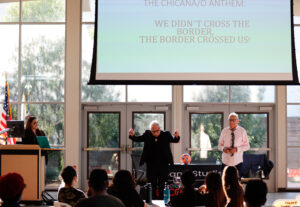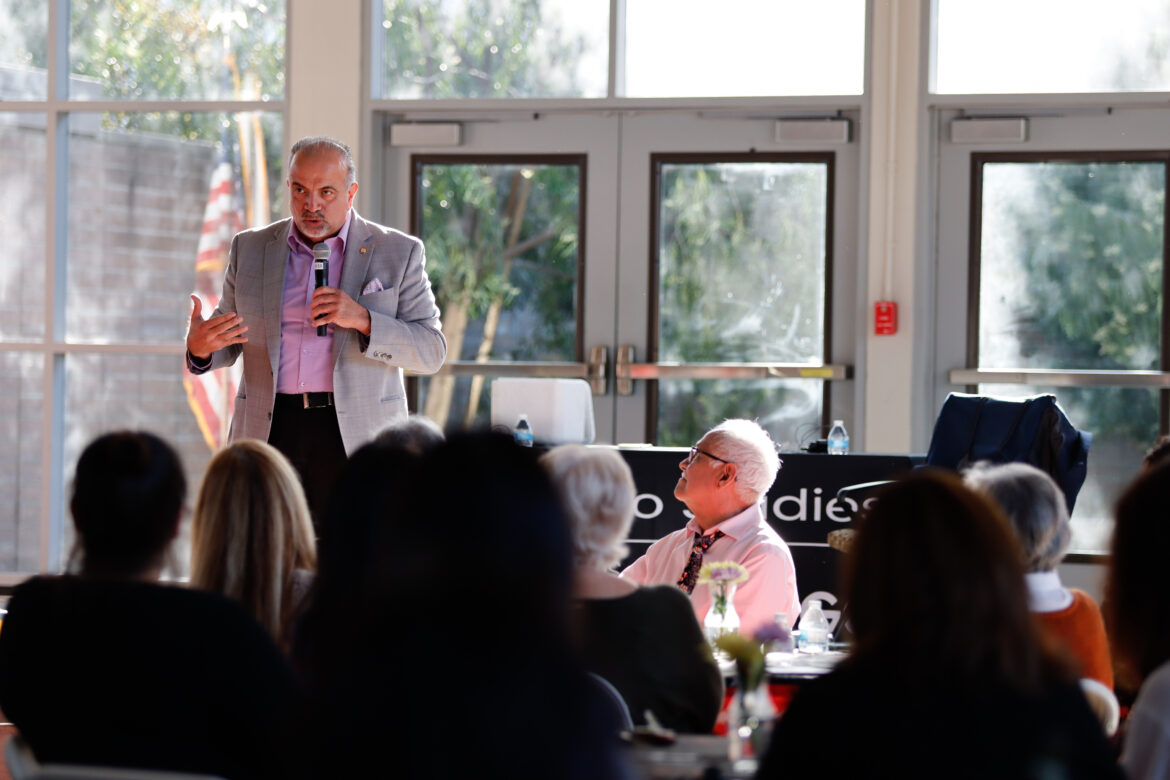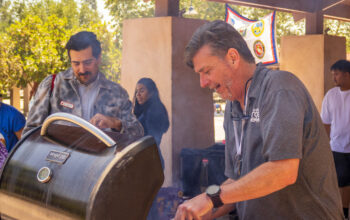Para leer el artículo en español, haga clic aquí.
Two renowned men stood on stage reciting an anthem well-known in the Chicano movement. One man with a delicate gold necklace adorning his black-on-black formal attire cried, “We did not cross the border,” while the other in a casual button-down and slacks completed it, “The border crossed us.”
The audience gently repeated it but after encouragement from the speakers, they loudly echoed the powerful phrase.

The Political Science, Economics, Criminal Justice, Law and Chicano Studies (PEACh) Department hosted its Fifth Annual Flor y Canto event on Thursday, featuring Luis Valdez and Jorge Huerta.
The event was coordinated by Professor of Chicano Studies Angelita Rovero and sponsored by the Student Equity and Achievement Fund and the Seamless Transfer for Ethnic Studies Fund.
Rovero kicked off the meeting by introducing the event, thanking attendees and highlighting the importance of cultural exposure.
“The legendary Luis Valdez and Dr. Huerta being with us was something I believed that our students needed to be exposed to,” Rovero said. “Because, at a time where we get so caught up in social media, I think a lot of students get lost, and we need to reel it back in and teach about our culture, our writings.”
Rovero went on to name Luis Valdez as the father of Chicano theater. His most notable works include his film “La Bamba,” his play “Zoot Suit,” which was the first Broadway Chicano play, and his formation of “El Teatro Campesino,” a theater troupe for farm workers.
He was accompanied by Jorge Huerta, a professional director and an authority in contemporary Chicano and U.S. Latino theater, according to Howlround Theatre Commons.
Shortly after, Rovero invited LACCD Chancellor Francisco Rodriguez to the stage, where he introduced the guests and emphasized their importance to him personally.
“As a person who absolutely looks to art, for motivation, for inspiration, for strength, for discernment, for clarity, for all of the joda [nuisances] we put up with as an administration,” Rodriguez said. “What we’re getting today is an alimento [nourishment]. It is a nourishment of the spirit of the soul with two living, iconic American writers, actors, producers, directors and playwrights.”
Valdez and Huerta took the stage shortly after.
Valdez opened the speech with his background in the Chicano movement and urged the younger generation to continue the fight.
Huerta moved on to discuss the history of Mexico and highlighted the importance of recognizing and respecting Indigenous cultures.
The pair explained that Mayan culture was infused throughout various aspects of life, from sports to anatomy, and how embracing one’s cultural heritage can unlock one’s potential.
In Valdez’s book, “The Theater of the Sphere,” he spotlights the concept of universal truths and his desire to share these ideas in an easily consumable way. Valdez ended his speech by stating these truths and that the roots of Mayan culture belong to Chicanos, Americans and lastly, all humans.
Attendee Daniel Gutierrez, a psychology major, expressed the satisfaction of his culture being validated and encouraged.
“I wanted to come out here and see what inspired the movements for Chicanos,” Gutierrez said. “I think I just needed affirmation of my culture and expressing it. It’s good to have a constant reminder. It’s also important to know—how do we continue them?”





